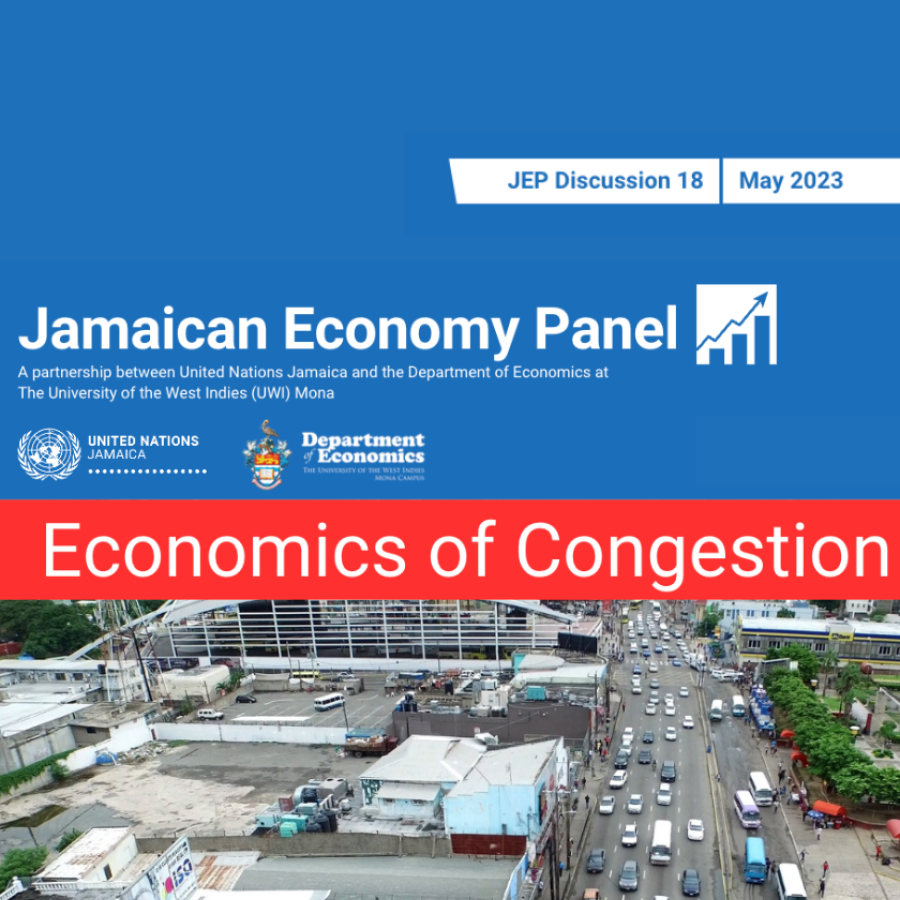The Cost of Congestion: The Impact of Vehicular Traffic in Jamaica’s Capital
05 May 2023
Today, the Jamaican Economy Panel (JEP) published its eighteenth discussion. In this discussion, the JEP was asked about the economics of congestion, the consequences of the ever-increasing traffic and possible solutions.
Kingston, Jamaica like many other rapidly expanding cities has not been able to avoid increasing traffic congestion. A survey conducted by The Human Resource Management Association of Jamaica (HRMAJ), found that, on average, people in Jamaica are spending 90-minutes per day in traffic, which for a small island developing state represents a huge cost. This not only has huge economic implications but can also pay a toll on the psychological and physiological wellbeing of the society as well as substantial environmental costs.

Ian Thomson, from the Economic Commission for Latin America and the Caribbean, explained that “in addition to the costs of congestion in terms of lost economic efficiency, there are also negative consequences in terms of social cohesion. The phenomenon of traffic congestion, which is caused mainly by relatively wealthy car drivers, lengthens journey times and, more importantly, forces up public transport fares. Owning a car is one of the fruits of human progress; using it in conditions of acute congestion or contamination is a social ill.”
Unfortunately, increasing the supply of roads is not the apparently simple solution to the issue. As Braess’ paradox suggests, adding one or more roads to a road network can actually slow down overall traffic flow through it, therefore it is important to consider various solutions to road congestion as well as the factors that contribute to it.
Dr. Nadine McLoud, Head, Department of Economics, University of the West Indies Mona stated that “Congestion is a significant distorting externality for Jamaicans. It cuts into work and leisure times and, by extension, leads to suboptimal work and home production levels, inter alia. Yet, there is no silver bullet to reigning in our congestion problem that stems from a plurality of factors. A workable congestion toolkit should explore the collective social impact of meaningful spatial permutations of a road pricing mechanism and its disposition (congestion charge in certain zones), an improved public transportation system including a generalised school bus system, shift work and remote work schedules and sensitisation campaigns.”
One of the other major concerns with the surge of congestion is the increase in vehicle pollution including higher levels of air and noise pollution. Panellists felt that the majority of drivers were not aware of the environmental implications of traffic congestion. Congestion involves the engine starting and stopping which means extra fuel consumption and therefore emissions such as carbon monoxide and nitrogen oxide which not only have a huge impact on the environment but also have an impact on our health. Panellists indicated that it is important to consider ways to disincentivise car use, as well as public education campaigns.
In conclusion, Jamaica, like many other countries, continues to struggle with increasing urbanisation resulting in high congestion levels. As aforementioned, the congestion is impacting not only physical and mental health but also the health of the planet. Regarding the Sustainable Development Goals, Goal 13, "Taking urgent action to combat climate change and its impacts," must be considered. The world remains "woefully off track in meeting the Paris Agreement target of limiting global warming to 1.5°C above pre-industrial levels and reaching net-zero carbon dioxide CO2 emissions globally by 2050." It is important Jamaica plays its role in addressing this. Evidently, there is not one single solution to combatting the rising congestion in Jamaica. A multistakeholder approach is needed that also involves raising public awareness and education on the topic to create a mindset and behaviour shift that also encourages people to consider other forms of transport.
The Jamaican Economy Panel is a partnership between the United Nations Resident Coordinator’s Office (UNRCO) and the Department of Economics at the University of the West Indies (UWI) Mona. The JEP brings together a select group of economic and public sector experts to discuss socio-economic questions. These questions help to highlight relevant economic issues and the collective expertise of the panellists.
For more information on the Jamaican Economy Panel and for the results of this JEP discussion visit here.

Ciara Patterson





